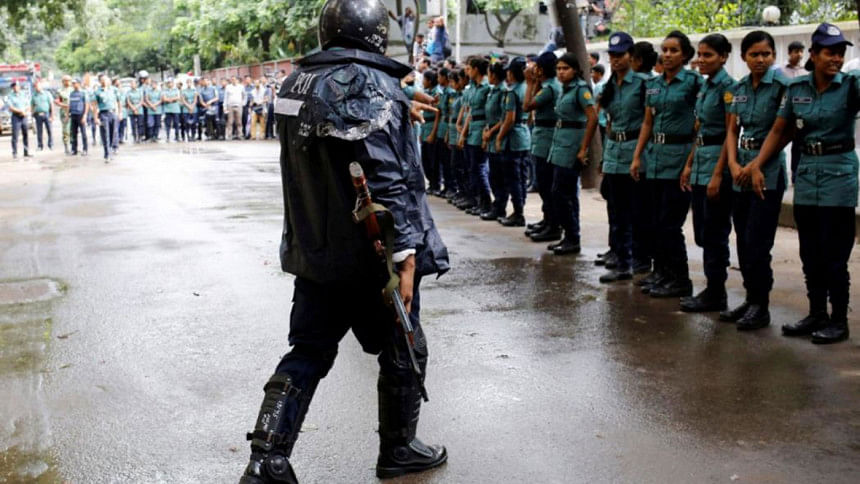How do we solve the image crisis for police?

Reports in the print and electronic media indicate that the image of police in public eyes has been worryingly tainted following the death of Major Sinha under circumstances pointing to the criminal collusive actions of some errant policemen, in addition to other serious infractions of policemen elsewhere in the country. This is distressing and frustrating in view of the fact that during the ongoing Covid-19 pandemic, the performance of our police, particularly their public-spiritedness and proactive stance, earned the organisation well-deserved plaudits. Sadly, public appreciation has been overtaken by public anger.
As the image of the police reflected by the mirror of public opinion conforms to what the police and the police culture are, both the image and culture are in danger of substantial damage. This is disappointing because there is no dearth of right-thinking, right-doing, courageous and conscientious policemen. Citations of police medals highlight the glowing performances of such personnel; and for every one recorded, many other instances of courage pass unnoticed. The point to note is that timely and just action taken by upright policemen on many occasions cannot wash out one of those image-shattering misdeeds.
On ground, the good work done by police over the years pales into insignificance in the face of their illegal action and unbecoming conduct which really hurts the susceptibilities of the people. There are indeed few jobs as demanding as that of a policeman. This perhaps explains why misconduct of the police severely pinches, irks, annoys and angers the people and has a lasting tarnishing effect on the public image of the police. When members of other profession fall from the pedestal of public respect, citizens may dismiss this fall as one of the frailties of human nature. In the case of policemen it usually makes the headline even if it is the most routine of human frailties.
A poignant saying in criminal law enforcement parlance states that no two days are similar for lawmen and that the sweet taste of appreciation is comparatively rare to them than the bitterness of the complaint. One has to agree that policing is an unpleasant coercive job where experience shows that retaining a good image is indeed a difficult achievement. Such an observation should not be construed as one of defending the misdeeds of deviant policemen.
For any discerning observer, it would only be logical to infer that the image crisis has not happened all of a sudden. Broadly speaking, it needs to be ascertained if organisational goals and operational imperatives have facilitated and encouraged deviant policing. Are policemen indulging in doing things which they ought not to do or refraining from doing things they ought to do to favour people in powerful positions? Do the policemen need such powerful people to obtain choice postings, to avoid being transferred, to mitigate disciplinary measures or to earn an advancement in rank? Is there a necessary basis providing for a mutually advantageous barter?
The above apprehension surfaces because the superintendence and control over the police rests in the executive branch of the government. To ask a specific question, did law and order and crime situation including drug trafficking in Teknaf Police Station assume serious proportion warranting deployment of lawless officials? Scores of the so-called encounter deaths reported in the media pertaining to this area point to such a premonition. Are our guardians desperate for short-term, spectacular results even though they may be illusory?
To state the obvious, police officers are sworn to uphold the law. They are presumed to have no other duty and to have no right to enforce laws selectively. The policemen who fail to do his duty or misuses his position is guilty of violating the trust of those who employ him—the public. The enforcers of law must not be allowed to violate the law, even to catch criminals. If they are allowed to resort to dirty methods they make the law dirty.
If a government becomes lawbreaker, it breeds contempt for law. To declare that the government may commit crimes to secure convictions of criminals would bring terrible retribution. For the interest of the government is not that it should win cases but that justice shall be done. Law is the means and justice is the end. A democratic society should be constrained to sacrifice police effectiveness at the altar of civil liberty as that is the desirable mode.
It would not be fair to put all the blame on the political class because there are allegations that at times police officers have implicitly proclaimed political expediency to justify extra legal actions. Are the public and the police caught in an increasingly norm-free, unpredictable and unjust environment? A fear is that a kind of Gresham's Law may have started to work wherein intrusion of extraneous interest in matters of police management has led to solicitation of further political influence. In such an eventuality, the inevitable result would be pervasive disillusionment, loss of pride and collegiality. Furthermore, in such a state, policing would be transformed from the professional imposition of a coherent moral consensus on society into myopic group activity.
The issue of image crisis cannot be appreciated in isolation. The basic features of our republican constitution, parliamentary democracy and development administration are in conflict with the inherited political organisational characteristics of the administrative structure. Therefore, without organisational renewal and revitalisation and the nurturing of professional skills, the police image would more often than not run the risk of being smeared.
Muhammad Nurul Huda is a former IGP.

 For all latest news, follow The Daily Star's Google News channel.
For all latest news, follow The Daily Star's Google News channel. 



Comments